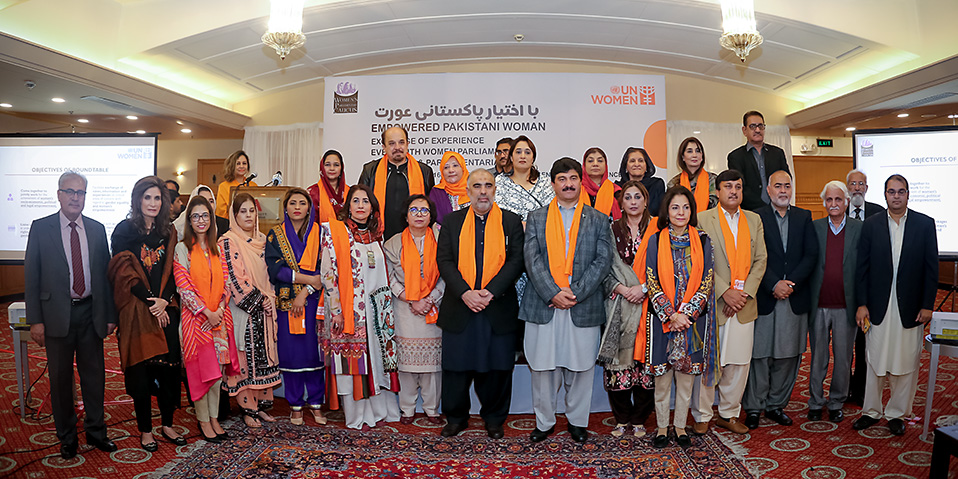Empowered Pakistani Woman: An exchange of experience event with Women Parliamentary Caucuses and Parliamentarians
‘Greater and effective representation of women in decision-making process crucial to end violence’Date:
[Press release]

Islamabad, Pakistan — “We cannot achieve gender equality without ending violence against women and girls. I would strongly recommend Women Parliamentary Caucuses (WPC) of National and Provincial Assemblies to review all existing laws and introduce amendments in bills for further improving legislation to safeguard women rights and end violence,” said Speaker National Assembly Asad Qaiser as the chief guest of an exchange of experience event with provincial Women Parliamentary Caucuses and parliamentarians titled ‘Empowered Pakistani Woman’ jointly organized by UN Women Pakistan and WPC here on Wednesday.

The event was arranged in connection with 16 Days of Activism against Gender-Based Violence, a global campaign that takes place each year from 25th of November, the International Day for the Elimination of Violence against Women, to 10th of December, International Human Rights Day. The 16 Days campaign is used as an organizing strategy by individuals and organizations around the world to call for the prevention and elimination of all forms of violence against women and girls.
The participating parliamentarians signed a joint resolution that reflected their collective determination to empower Pakistani women through supporting the enactment of pro-women legislation.
MNA and Secretary WPC Munaza Hassan gave the welcoming remarks. Senator Farhatullah Babar; Firdous Shamim Naqvi, Opposition Leader Sindh Assembly; Mehmood Jan, Deputy Speaker Khyber Pakhtunkhwa (KP) Assembly, and Patron-in-Chief WPC KP; Uzma Kardar, Chairperson Standing Committee on Gender Mainstreaming Punjab, Aisha Mukhtar, Deputy Country Representative UN Women Pakistan; members of national and provincial assemblies, and representatives from civil society and media participated in the event.
Speaker National Assembly said that the government was committed to empower women and enhance their representation in the parliament. We have 17 women parliamentary secretaries in the National Assembly that substantiates the government’s commitment to women’s empowerment. “We will be left behind if men are not part of efforts to empower women and end violence. I’m glad to witness that male legislator champions are recognized for their work around gender equality,” Asad Qaiser said. He appreciated the collaboration of UN Women with the WPCs that helped participanting parliamentarians from provincial assemblies to learn from the experiences of each other and replicate good practices in their respective legislative processes. “I hope that the technical assistance from UN Women Pakistan will continue to make sure we leave no behind as we advance our journey towards achieving the Sustainable Development Goals (SDGs) and other international commitments on gender equality,” Asad Qaiser remarked.
“As the world is halfway through the 16 Days of Activism against Gender Based Violence campaign, women legislators of Pakistan are ready to address all forms of violence through gender sensitive legislation in line with Pakistan’s constitutional guarantees and international commitments,” said Munaza Hassan, Secretary Women’s Parliamentary Caucus (WPC) of the National Assembly of Pakistan.
“Despite political differences, WPC is consistently proving itself as a platform that can enable all women parliamentarians to work collectively for the empowerment of women. Therefore, strengthening of national and provincial caucuses is key to improve coordination for pro-women laws,” said the Secretary WPC.
Enhancing women’s participation and ending violence against women and girls are key mandated functions of WPC. “When I see my male colleagues joining the cause of gender equality, I feel stronger and more optimistic,” Munaza Hassan stated. “Women’s representation is important for disadvantaged communities, especially girls who cannot go to schools and who are driven into early, forced or child marriages.” In order to protect and defend the interests of half of our population, we need greater representation of women in political decision making.
Aisha Mukhtar said, “Women and girls in Pakistan continue to face an unprecedented set of challenges when it comes to achieving their goals. By working to ensure political accountability on gender equality, parliamentarians can accelerate impactful change for women and girls at the national and provincial level.”
We are standing at a very opportune moment in time, she said while adding, “2020 will celebrate five years of Sustainable Development Goals (SDGs), 10 years of UN Women and 25 years of Beijing Platform for Action. We must galvanize the momentum developed through these significant milestones to advance gender responsive policy frameworks, pro women legislations and inclusive and effective governance. I hope that together we will be able to achieve our common vision for a gender equal and inclusive Pakistan.”
The event was divided into two parts. In the first part legislators deliberated on strengthening WPCs as agents of change and brainstormed on key challenges and opportunities for collaboration between federal and provincial caucuses. They discussed how to use CEDAW (the Convention on the Elimination of all Forms of Discrimination Against Women), Beijing Platform for Action and the SDGs indicators for building cross-party consensus on gender issues, especially pro-women legislation for ending violence against women and girls.
While the second part comprised of two panel discussions with female and male parliamentarians respectively, on the need and relevance of policy advocacy for pro-women legislation.
First panel discussion with male legislator champions focused on how male champions could support legislative reforms to align domestic laws with national and international commitments. Firdous Shamim Naqvi, Mehmood Jan and Senator Farhatullah Babar were the panelists of this session that was moderated by Nabila Malick, EVAW (Ending Violence Against Women) Advisor UN Women Punjab.
The second panel discussion with women parliamentarians including Nusrat Sehar Abbasi, MPA Sindh, Shakeela Naveed Noor Qazi, Chairperson WPC Balochistan, and Uzma Kardar, explored how to identify and engage allies and build momentum for legislative reforms. Younas Khalid, GBV Advisor UN Women Pakistan, moderated the discussion.
The event offered a great opportunity to parliamentarians to formalize partnerships and build solidarity between national and provincial caucuses in order to collaborate on gender equality and women’s empowerment, developing gender-sensitive legislative frameworks, and reviewing and supervising gender-inclusive programmes and policies.